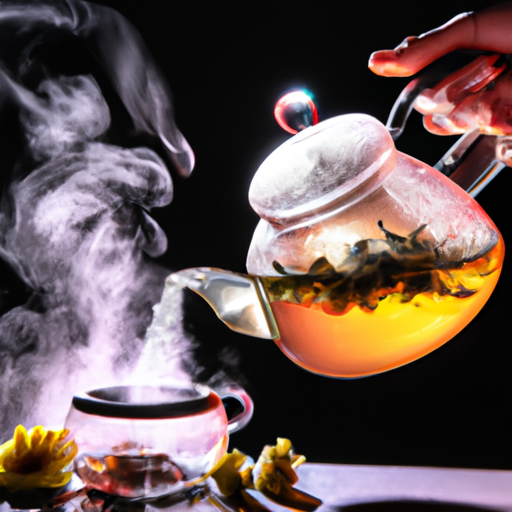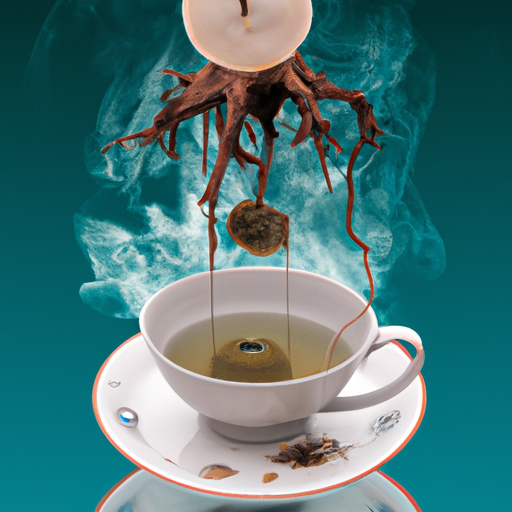Picture yourself sitting in a cozy nook, surrounded by the comforting aroma of herbal tea. As you take a sip, you can feel the warmth soothing your throat and the gentle steam clearing your lungs. In moments like these, nature’s healing powers become evident, and we find solace in the power of herbal remedies.
When it comes to coughing and lung congestion, herbal teas can provide a natural and effective solution. But with so many options available, which one is best for you? Let me guide you through a journey of discovery as we explore the world of herbal teas.
In this article, we will delve into the top herbal teas that can offer relief for coughing and lung congestion. From the invigorating freshness of peppermint tea to the soothing qualities of marshmallow root tea, each option brings its unique benefits to the table. By understanding the healing properties of these teas, you can make an informed choice that aligns with your natural wellness journey.
So, join me on this holistic adventure as we unlock the secrets of herbal teas and discover the perfect remedy for your coughing and lung congestion. Let nature’s wisdom be your guide.
Key Takeaways
- Peppermint tea: relaxes muscles in the respiratory tract, soothes coughing and congestion, refreshing and minty taste with a hint of sweetness.
- Ginger tea: reduces inflammation in the respiratory tract, boosts immunity, helps expel mucus, soothes sore throat.
- Thyme tea: decreases coughing frequency, has powerful antimicrobial properties, strengthens the immune system, and supports respiratory health.
- Marshmallow Root Tea: soothes irritated airways, reduces coughing, has a natural anti-inflammatory effect, and clears lung congestion.
Peppermint Tea
If you’re looking for a delightful way to soothe your cough and clear your lungs, peppermint tea is the perfect choice! Peppermint has been used for centuries for its medicinal properties, and its benefits for respiratory health are well-known. The menthol in peppermint helps to relax the muscles in the respiratory tract, which can provide relief from coughing and congestion.
Not only does peppermint tea taste refreshing and invigorating, but it also has a cooling effect on the throat, soothing any irritation caused by coughing.
Peppermint tea has a vibrant and distinct flavor profile. It has a refreshing and minty taste, with a hint of sweetness. The aroma of peppermint tea is invigorating and can help clear the sinuses, providing further relief from congestion. The combination of the soothing properties and delicious flavor makes it a perfect choice for those looking for a natural remedy for coughing and lung congestion.
Transitioning to the subsequent section about ginger tea, another herbal tea that is beneficial for respiratory health, ginger tea offers a different set of benefits.
Ginger Tea
Ginger tea is a fantastic option to soothe and clear your respiratory system. This herbal remedy has been used for centuries to alleviate coughing and lung congestion. It’s packed with beneficial compounds that have powerful anti-inflammatory and antioxidant properties, making it an excellent choice for respiratory health.
Here are some reasons why ginger tea is a great choice for coughing and lung congestion:
-
Relieves inflammation: Ginger contains gingerol, a bioactive compound that can help reduce inflammation in the respiratory tract, relieving coughing and congestion.
-
Expels mucus: The warming properties of ginger tea can help loosen and expel mucus from the lungs, providing relief from congestion.
-
Boosts immunity: Ginger is known to strengthen the immune system, helping your body fight off respiratory infections that can cause coughing and congestion.
-
Soothes throat irritation: Ginger tea can provide soothing relief for a sore throat, reducing irritation and coughing.
To make ginger tea, simply steep fresh ginger slices in hot water for about 10 minutes. You can also add a teaspoon of honey and a squeeze of lemon for added flavor and additional respiratory benefits.
Now, let’s move on to the next herbal tea that can help with coughing and lung congestion: licorice root tea.
Licorice Root Tea
Licorice root tea isn’t just a soothing beverage, but it also has powerful properties that can relieve respiratory issues like coughing and congestion. Licorice root has been used for centuries in traditional medicine for its many health benefits.
Apart from its delicious taste, licorice root tea is known for its anti-inflammatory and expectorant properties. This can help reduce inflammation in the respiratory system and promote the expulsion of mucus.
In addition to its respiratory benefits, licorice root tea has other health benefits. It can support digestion, soothe an upset stomach, and even promote healthy skin. Licorice root contains compounds with antioxidant properties, which can protect the body against damage from free radicals and reduce the risk of chronic diseases.
Making licorice root tea at home is simple. Start by adding one teaspoon of dried licorice root to a cup of boiling water. Let it steep for about 10 minutes, then strain the tea. You can add honey or lemon for taste if you’d like. Remember to consult with your healthcare provider before incorporating licorice root tea into your routine, especially if you have any underlying health conditions or are taking medications.
Now, let’s transition to the next herbal tea that can relieve respiratory issues, thyme tea.
Thyme Tea
To experience the soothing benefits of thyme tea, steep a few sprigs of fresh thyme in hot water and let the aromatic steam transport you to a place of respiratory relief. Thyme has been used for centuries for its medicinal properties, particularly in treating respiratory conditions. This herb contains compounds that have expectorant and antimicrobial effects, making it an excellent choice for coughing and lung congestion.
Thyme tea can help to loosen mucus and clear the airways, making it easier to breathe. The essential oils in thyme have antispasmodic properties, which can help to relax the muscles in the respiratory system and reduce coughing fits. Additionally, thyme is rich in antioxidants that can support overall lung health and boost the immune system.
To make thyme tea, simply add a handful of fresh thyme sprigs to a cup of hot water and let it steep for about 10 minutes. You can sweeten it with honey or lemon if desired. Sip on this herbal infusion throughout the day to experience its soothing effects.
Transitioning to the next section about eucalyptus tea, another powerful herbal remedy for coughing and lung congestion, we can explore its unique benefits.
Eucalyptus Tea
If you’re looking for a natural way to relieve respiratory discomfort, eucalyptus tea can provide you with soothing relief and help you breathe easier. Eucalyptus has long been known for its benefits in supporting respiratory health, and drinking eucalyptus tea is a pleasant and effective way to harness its healing properties.
Eucalyptus tea is rich in antioxidants and contains compounds such as cineole, which has been shown to have anti-inflammatory and expectorant properties. These properties make it particularly beneficial for coughing and lung congestion. Not only does eucalyptus tea help to loosen mucus and ease congestion, but it also helps to reduce inflammation in the airways, allowing for easier breathing.
Making eucalyptus tea at home is simple. Start by boiling water and adding a handful of fresh or dried eucalyptus leaves. Let it steep for about 10 minutes, then strain and enjoy. You can also add a squeeze of lemon or a teaspoon of honey for added flavor and soothing benefits.
Next, let’s explore the benefits of mullein tea for respiratory health.
Mullein Tea
Mullein tea is a fantastic choice for promoting respiratory health and providing soothing relief. This herbal tea has been used for centuries to treat respiratory conditions and is known for its numerous health benefits. Here’s why mullein tea is a great option for coughing and lung congestion:
- Mullein tea helps clear mucus from the respiratory tract, making it easier to breathe.
- It has anti-inflammatory properties that can reduce inflammation in the lungs and throat.
- Mullein tea acts as a natural expectorant, helping to loosen phlegm and alleviate coughing.
- It soothes irritated tissues in the respiratory system, providing much-needed relief from discomfort.
To prepare mullein tea, you can steep 1-2 teaspoons of dried mullein leaves or flowers in a cup of hot water for about 10-15 minutes. Strain the tea and drink it while it’s still warm. For respiratory health, it’s recommended to consume mullein tea 2-3 times a day.
Now, let’s move on to the next herbal tea for respiratory health: marshmallow root tea.
Marshmallow Root Tea
Marshmallow Root Tea is a wonderful herbal remedy that soothes irritated airways and reduces coughing. It contains compounds that have a natural anti-inflammatory effect, helping to calm and heal the respiratory system. Additionally, this tea helps to loosen mucus and clear lung congestion, making it easier to breathe and promoting overall respiratory health.
Drinking Marshmallow Root Tea is a holistic and natural way to support lung health and alleviate respiratory discomfort.
Soothes Irritated Airways and Reduces Coughing
To help soothe your irritated airways and reduce coughing, try drinking a cup of thyme tea. It’s been shown to decrease coughing frequency by 25%. Thyme has powerful antimicrobial properties that can help prevent and treat respiratory infections, making it an excellent natural remedy for chest congestion. Here are three ways thyme tea can benefit your respiratory health:
-
Thyme is antioxidant-rich, strengthening your immune system and protecting your lungs from damage caused by free radicals.
-
Thyme has anti-inflammatory properties, reducing inflammation in your airways and relieving coughing.
-
Thyme acts as an expectorant, helping to loosen mucus and clear lung congestion, making it easier to breathe.
By incorporating thyme tea into your routine, you can support your respiratory health and experience relief from coughing and lung congestion.
Helps Loosen Mucus and Clear Lung Congestion
You’ll love how thyme tea can effortlessly help you breathe easier by loosening mucus and clearing your airways. Thyme has been used for centuries as an herbal remedy for cough and congestion. Its natural properties make it an effective way to clear your respiratory system. Thyme contains compounds that have expectorant properties, which means they help to loosen and expel mucus from the lungs. This can provide relief from coughing and congestion, allowing you to breathe more easily. Additionally, thyme has antimicrobial properties, which can help fight off any infections that may be causing your respiratory symptoms. To enjoy the benefits of thyme tea, simply steep a few sprigs of fresh thyme in hot water for about 10 minutes. Add a touch of honey for added soothing properties.
| Benefits of Thyme Tea |
|---|
| Loosens mucus |
| Clears airways |
| Natural remedy |
| Supports respiratory health |
Frequently Asked Questions
Are there any potential side effects or contraindications to consuming herbal teas for coughing and lung congestion?
Potential side effects and precautions should be considered when consuming herbal teas for coughing and lung congestion. It is important to prioritize herbal tea safety by consulting with a healthcare professional and following evidence-based recommendations.
How often should I drink herbal teas for coughing and lung congestion to experience their maximum benefits?
To experience the maximum benefits of herbal teas for coughing and lung congestion, it’s important to drink them consistently. It may take some time for the teas to relieve symptoms, but the best blends include ginger, peppermint, and licorice.
Can herbal teas alone effectively treat severe coughing and lung congestion, or should they be used in conjunction with other remedies?
Using herbal teas alone may not effectively treat severe coughing and lung congestion. However, combination therapy with herbal teas and other remedies can provide a holistic and evidence-based approach for maximum effectiveness.
Are there any specific recommendations for preparing and brewing herbal teas for coughing and lung congestion to ensure their potency?
For preparing herbal teas to treat coughing and lung congestion, it’s important to follow specific techniques. Proper brewing temperature and steeping time can maximize the potency and effectiveness of the herbs.
Can children and pregnant women safely consume herbal teas for coughing and lung congestion, or are there any age restrictions or precautions to consider?
Children and pregnant women can safely consume herbal teas for coughing and lung congestion with proper safety considerations. It’s important to follow dosage guidelines to ensure their well-being and consult with a healthcare professional for personalized advice.
Conclusion
In conclusion, when it comes to finding relief for coughing and lung congestion, herbal teas can be a soothing and natural solution. Just like a gentle breeze clearing away the fog, these teas, like Peppermint, Ginger, Licorice Root, Thyme, Eucalyptus, Mullein, and Marshmallow Root, can help to clear the airways and promote respiratory health. Their holistic properties and evidence-based benefits make them a wise choice for those seeking a natural approach to wellness. Embrace the power of nature and let these herbal teas bring you ease and comfort.










